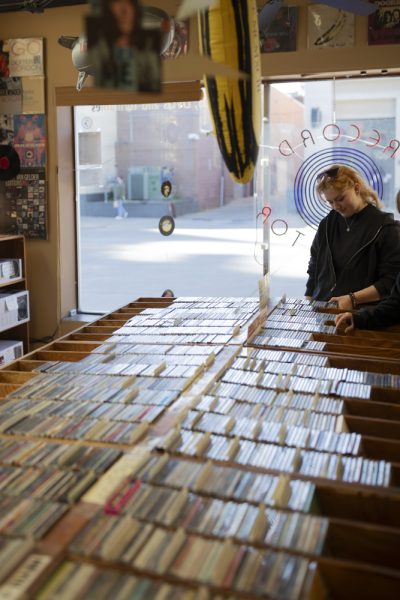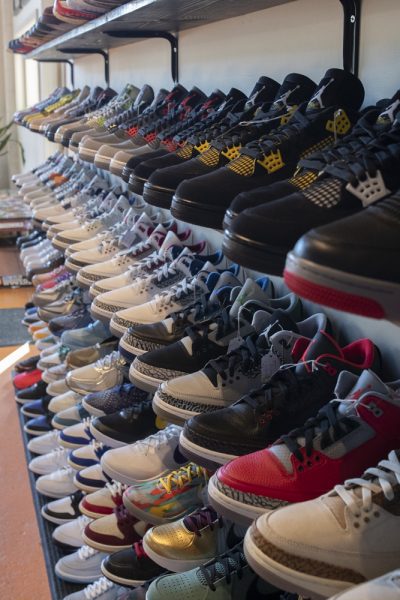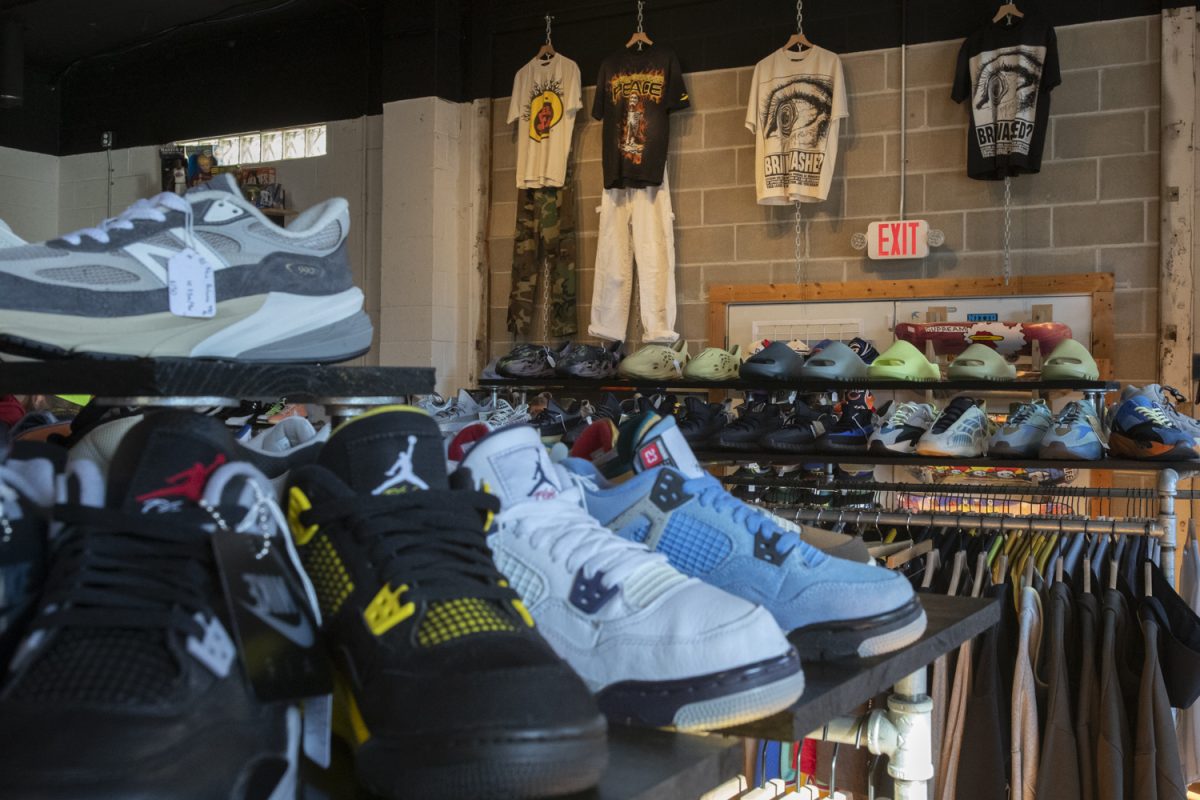Iowa City is a unique college environment, thanks in large part to its robust downtown that bleeds into the campus with each flourishing business filling a niche. Just as these establishments meet a need in the community, the community provides something they need: resellable items.
“We sell classical, to hip hop, to jazz, to industrial music. We’ll take anything from anyone, for the most part,” Record Collector Manager Jo Adams said.
The records at Iowa City store Record Collector come in many different shapes and sizes, whether on the walls or sitting on stands for people to peruse.
“[The records] are a combination of items we order in new, like new releases or reissues. The used items in the store are brought to us from the surrounding areas, so people come in to sell their old collections,” Adams said.
Reselling can sometimes get complicated, though, as some people try reselling stolen items. Adams discussed the precautions she takes at the store to address this. In this case, the closeness of the community has so far always worked in her favor.
“Since we are such a niche market and there is only one of us in this town, people selling stolen stuff doesn’t happen so much here at all. It’s not like a piece of clothing or furniture where you can go to one out of 10 stores to resell it to somebody else,” Adams said.
“If people are going to be stealing something from us, they’re not going to bring it back,” she continued. “Chances are, if someone has a large collection in town that gets stolen, we know that person.”
After stealing a record to sell it for more than the original price, an individual can go through an intense process. If the person does not know what kind of record they are dealing with along with all the details, the resale market can get smaller.
“A lot goes into knowing exactly what pressing you have, the grating, the condition, everything,” Adams said. “I feel like [a record] is an item that people don’t really steal for a resale type of situation, considering we are the only store in town that they could sell it back to.”

Alongside the physical store, Record Collector has a website for online sales. They use the website Discogs, which also serves as a database for record collection and music discoveries.
“They have releases that are blocked for sale, so bootlegs are a big thing in records where somebody may have pressed something without the permission of the artist or the label that owns [the record],” Adams said.
To date, there has not been suspicious activity from the Discogs site, proving the reliability of its security measures. Another reseller, Ragstock, is amping up their own security at their Iowa City location.
The store has expanded throughout the Midwest, increasing its exposure to recycled fashion.
“Basically, the company has buyers that go all across the country [to] purchase [and] resell stuff, and it all goes back to a warehouse,” employee Jacy Gabaldon said.
Gabaldon also mentioned that the store website is not raking in as many sales as the brick-and-mortar stores.
“For the website, we do have stuff that is resold, but it’s pictures of specific items. If you want a wider variety, you have to go into the store to see all the vintage and new [things] that we have,” Gabaldon said.
Environmentalism plays a key role in why there are so many downtown resellers, said Brooke Mitchell, the manager at Ragstock. Like many other thrift stores, a number of the locations are family-owned, which incentivizes ethically conscious shoppers.
“I think it’s also due to the fact that people enjoy thrifting and experiencing the thrill of finding an off-the-wall item,” she said.
With walls decorated by hats, shoes, and skateboard decks, resale store Vice Iowa City shows off its streetwear fashion.
Even with a small space, the owners of Vice create an environment that brings the style of clothes they sell to life. Music blasts through the speakers to welcome anyone walking through their doors.
Refurbished clothes are not all Vice has to offer. Along with a solid variety of new clothes, they also offer new shoes. While their shoe collection is smaller compared to the amount of clothes they have, they take up the space of an entire wall, ceiling to floor.
One of the three owners, Peter Krogull, described how the store came to be. Krogull, along with Tony Casella and Demetrius Perry, worked to compile the items they each separately sold and created Vice.
“I was selling stuff online and Demetrius … had an event called “Kick It” and reached out and was like, ‘I think there’s a huge demand for this in Iowa City, let’s sell at this event and maybe come together after that and open up a store,” Krogull said.
On the clothing side of sales, much of it comes from customers looking to get rid of a few things. Even though the store does not accept donations, they do offer the chance to trade in items or to get store credit.
While they do have an in-person store, the trio also have their items listed on eBay. Many other stores might think of creating their own website, but that can become a difficult task.
“If you were to just have your own website, doing Instagram, you would have to have [consumers] find it organically or do a bunch of advertisement, and sometimes that doesn’t hit your target market. So, I feel like you cover all your bases with someone on eBay,” Krogull said.
University of Iowa professor Lauren Haldeman also provided some insight into why a store may not want to create its website. While part of it is simply trying to get eyes on the site, the official steps of trying to be an online store that accepts payments can become difficult.
RELATED: Student look book for this upcoming fall
“I would say the biggest thing is taking credit card payments. It needs a lot of security around it. You need a really good system around it, so using a site like eBay or Etsy would provide you with that security,” Haldeman said.
The trouble of finding a way to securely accept payments can be difficult, but there are always trusted third-party options to attach to a site. Even with that option, many stores opt to use eBay or Etsy, as it removes the hassle of going through design and payment processes.
Haldeman acknowledged that eBay or Etsy stores often receive backlash for using designs without crediting the online sources they’re from. She cited the website Unsplash as a resource for resellers to pull designs from. The site even allows users to credit photographers and artists.

Another big reason why many stores, especially reseller stores, would choose these options is merely the fact that they are so popular. Krogull said when he first started using eBay before the creation of Vice, there were nearly 180 million users already. According to eBay’s website, it currently has 133 million active buyers and 2.1 billion listings.
With that many eyes already on the site, it creates a great opportunity for customers looking for specifics to find a variety of what they want.
“If someone looks for something and they type in ‘vintage Nike t-shirt,’ and you have a bunch of Nike t-shirts on your eBay page, they’ll find those,” Krogull said.
Similar to Vice, Daydreams Comics used to have an eBay presence. Since the new owner, Nathan Parriott, took over the store, they no longer have listings on the site. But Parriott has acknowledged it will be something that needs to be created soon.
“I will have to eventually do that, but I’m not doing that right now. We do get enough business to maintain a physical location,” Parriott said.
While Daydreams does not have as many resale items, they do receive a few. Most of their product comes in new, but there are specific occasions where they will take in previously owned comics.
A few of these special circumstances are when customers are looking to find a way to downsize their collection. Parriott said many people either grow too old to have a huge collection or have to find a way to leave things behind as they move. Daydreams will step in and buy some of these collections, benefiting both parties in the deal.
Downtown Iowa City is home to so many stores that emphasize trade-ins, but Parriott doesn’t believe that trend ends with the community.
“We live in a time where culture is readily available. Popular culture, I mean. And it’s interesting to explore that,” Parriott said.
With the past and present mixed into one culture, people find a way to connect with those who came before them, Parriott said. Through comics, clothes, and records, the Iowa City community is reselling the past and trading in for the present.
“We can draw inspiration from more readily than we’ve ever been able to,” Parriott said.



